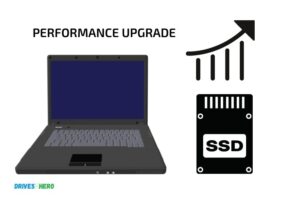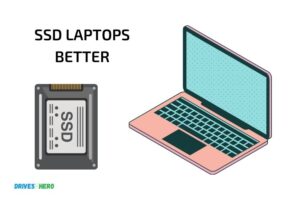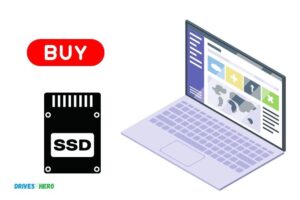Different Types of Ssd for Laptop! A Comprehensive Guide
There are four main types of SSDs for laptops: SATA, M.2, PCIe NVMe, and U.2.
Solid State Drives (SSDs) are a popular choice for laptop storage due to their faster speeds, longer lifespan, and reliability compared to traditional Hard Disk Drives (HDDs).
There are different types of SSDs designed to fit various laptop configurations and performance requirements.
SATA SSDs are the most widely used type due to their compatibility with most laptops and affordable pricing. They provide a significant performance boost compared to traditional HDDs, but may not be as fast as the more advanced PCIe NVMe SSDs.
M.2 SSDs are perfect for slim laptops and ultrabooks, as their compact form factor allows for a thinner design. They are available in both SATA and NVMe variations, with the latter offering higher speeds.
Comparison of Different Types of SSDs for Laptops
| Type of SSD | Interface | Storage Capacity | Speed | Form Factor |
|---|---|---|---|---|
| SATA SSD | SATA | 120GB – 4TB | Up to 600 MB/s | 2.5-inch |
| M.2 SATA SSD | M.2 | 120GB – 2TB | Up to 600 MB/s | M.2 2280 |
| NVMe SSD | PCIe | 120GB – 8TB | Up to 7,000 MB/s | M.2 2280 / U.2 / AIC |
| U.2 SSD | U.2 | 240GB – 4TB | Up to 3,500 MB/s | U.2 2.5-inch |
| mSATA SSD | mSATA | 32GB – 1TB | Up to 600 MB/s | mSATA |
Key Takeaway

Five Facts About Different Types of SSDs for Laptops
How Different Types Of Ssds Work
Ssds (solid-state drives) are an essential component of laptops that change how we use them. Unlike traditional hard drives, ssds do not contain any movable parts, resulting in faster, quieter, and more reliable storage devices.
Nand Flash Memory
Nand flash memory is the technology used by all ssds. A nand gate is a specific type of logic gate, and “nand” means “not and. ” This technology uses semiconductors to store and recall data without a need for a power source.
Here are some key points related to nand flash memory:
- Nand flash memory cells are grouped in pages, and the pages are then organized into blocks.
- Ssds use a controller that interacts with nand flash memory to determine how data is stored, managed, and accessed.
- Without a controller, data cannot be reliably written and read from nand flash memory.
Mlc
Mlc stands for multi-level cell, and it is one of the most common types of nand flash memory. The name describes the technology that enables mlc-based ssds to store multiple bits of data per cell.
Here are some key points related to mlc:
- Mlc can store two or more bits per cell, making the technology more cost-effective than other nand types.
- Mlc has a higher endurance than tlc and qlc, meaning it can handle more write cycles before wearing out.
Tlc
Tlc stands for triple-level cell. It stores three bits of data per cell, making it a more economical option than mlc.
Here are some key points related to tlc:
- Tlc is cheaper than mlc, but has reduced write endurance. Ssds with tlc may wear out faster than those with mlc.
- Tlc is more sensitive to reading and writing errors than mlc. However, the error rate has been decreasing at a rapid pace, and tlc is now an excellent choice for almost any application.
Qlc
Qlc stands for quad-level cell. It stores four bits of data per cell, making it the most economical option of all.
Here are some key points related to qlc:
- Qlc has the lowest endurance of all the ssd options, meaning it is suitable for less data-intensive applications.
- Similar to tlc, qlc is more sensitive to reading and writing errors. However, recent advancements in technology have improved error correction levels, making qlc an excellent choice for personal and business use.
Understanding the different types of ssds and how they work is crucial to make the right decision when considering purchasing a laptop or upgrading its storage.
As technology advances, ssds are becoming more affordable and reliable, making them a popular choice for users.
Why Choose Ssd Over Hdd
When it comes to laptop storage, you have two main options: hdd (hard disk drive) and ssd (solid-state drive). While both have their pros and cons, more and more people are opting for ssds over traditional hdds.
Here’s why:
Speed
One of the biggest advantages of ssds over hdds is speed. Ssds use flash memory to store data, whereas hdds use spinning disks.
This means that ssds can access data much faster than hdds, resulting in faster boot times, faster application loading times, and overall snappier performance.
- Ssds can read and write data up to 10 times faster than hdds.
- Ssds have no moving parts, which means there is no need for the time it takes the spinning disks to speed up or slow down.
- Ssds can handle multiple tasks simultaneously, which is especially useful for multi-taskers.
Durability
Another advantage of ssds over hdds is durability. Because ssds have no moving parts, they are less prone to physical damage than hdds.
This makes them ideal for use in laptops, which are often transported and subjected to bumps and jolts.
- Ssds are less likely to suffer from physical damage when dropped or bumped, which makes them perfect for portable devices.
- Ssds generate less heat than hdds, which can lead to a longer lifespan.
- Ssds are not affected by magnetic fields, which can damage hdds.
Energy Efficiency
Ssds are also more energy-efficient than hdds. Because they have no moving parts, they require less power to operate, which means your laptop’s battery will last longer.
- Ssds consume less power than hdds, at a rate of about 20-30% less.
- Ssds produce less heat, which means your laptop’s cooling system will have an easier time keeping things running smoothly.
- Ssds use less power during boot-up, which means your laptop will start up faster and use less power during the process.
Noise
Finally, ssds are quieter than hdds. Because they have no moving parts, they don’t make the clicking and whirring noises associated with hdds.
- Ssds produce no noise during operation, which can make for a more peaceful computing experience.
- Ssds do not vibrate like hdds, which can lead to less noise pollution in sensitive environments.
- Ssds are perfect for environments where silence is of utmost importance, such as libraries or movie theaters.
Ssds have several advantages over hdds, including faster speeds, greater durability, improved energy efficiency, and quieter operation.
If you’re in the market for a new laptop, consider opting for an ssd-based model for a better overall computing experience.
Sata (Serial Ata) Ssd
Different Types Of Ssd For Laptop: Sata (Serial Ata) Ssd
When it comes to choosing an ssd for your laptop, one of the options you may come across is the sata (serial ata) ssd.
Sata is a type of interface used to connect storage devices such as hard drives and solid-state drives to a computer’s motherboard. We’ll explore the advantages and disadvantages of sata ssds to help you make an informed decision.
Advantages Of Sata Ssd
- Compatibility: Sata ssds are compatible with most laptops and desktops, making them a versatile option for upgrading or replacing your computer’s storage.
- Cost-effective: Sata ssds are generally more cost-effective than other types of ssds such as pcie ssds, which makes them an attractive option for anyone looking to upgrade their laptop’s storage without breaking the bank.
- Energy efficient: Sata ssds are designed to consume less power than traditional hard drives, making them more energy-efficient and reducing the amount of heat generated by your laptop.
- Durable: Sata ssds are less likely to fail due to mechanical issues because they don’t have any moving parts. This means that they are less susceptible to damage from drops, bumps, and other physical shock.
Disadvantages Of Sata Ssd
- Slower speeds: Sata ssds are not as fast as other types of ssds such as pcie ssds. This can affect the speed of tasks such as booting up your laptop or copying large files.
- Limited bandwidth: Sata ssds have a limited bandwidth, which means that they can’t keep up with the high-speed data transfer rates of other types of ssds. This can be a disadvantage if you need to transfer large amounts of data quickly.
- Not suitable for high-end applications: Sata ssds may not be suitable for high-end applications such as gaming or video editing, where speed and performance are crucial. In these cases, a faster ssd interface such as pcie may be a better option.
Sata ssds are a cost-effective and durable option for upgrading the storage of your laptop. While they may not have the fastest speeds or bandwidth of other types of ssds, they are compatible with most laptops and are designed to be energy efficient.
M.2 Ssd
M. 2 ssds are getting popular among laptop users due to their fast read and write speed, compact size, and versatility. We’ll discuss the advantages of m. 2 ssd and disadvantages of m. 2 ssd.
Advantages Of M.2 Ssd:
- M.2 ssds offer faster read and write speeds compared to traditional ssds and hdds.
- M.2 ssds come in different sizes which make them more versatile and adaptable. You can place them on your laptop’s motherboard or m.2 slots if it is available.
- M.2 ssds also consume less power compared to traditional ssds and hdds, which can prolong your laptop’s battery life.
- They are lighter in weight and produce less heat compared to traditional storage drives.
- M.2 ssds are not affected by vibration and shocks since they do not contain any moving parts.
Disadvantages Of M.2 Ssd:
- One of the main disadvantages of m.2 ssds is their cost compared to traditional ssds and hdds. They cost more due to their compact size and high-performance capabilities.
- M.2 ssds are not compatible with all laptops or devices, and you need to check their compatibility before you purchase one.
- If you have a smaller sized laptop, then it might not be compatible with m.2 ssds, or it might not have a slot dedicated to the m.2 ssd.
- M.2 ssds have a lower capacity compared to traditional hdds, and they come with limited writes. Writing large files or frequently re-writing on m.2 ssds may harm your device’s lifespan.
M. 2 ssds have revolutionized the laptop market by providing faster read and write speeds, smaller size, and more versatility than traditional ssds and hdds.
However, they come at a premium price and may not be compatible with all laptops. It’s important to research the m. 2 ssds before purchasing one to check compatibility and capacity.
Pcie Ssd
Solid state drives have become a common replacement for traditional hard disk drives due to their faster data transfer speeds, enhanced reliability, and durability.
There are different types of ssds, each with their unique features, but this blog post will focus on pcie ssd.
Advantages Of Pcie Ssd
- Lightning-fast speeds: Pcie ssds offer incredibly fast data transfer rates that can outdo sata and nvme ssds.
- Low latency: With reduced latency, pcie ssds can read and write files faster than other types of drives, reducing boot times and application launch times.
- Improved gaming experience: Pcie ssds can provide lightning-fast game loading times and help reduce in-game stuttering.
- Highly compatible: Pcie ssds are compatible with a wide range of systems and can work with more interfaces than other types of ssds.
- Upgradability and customization: Pcie ssds offer superior customization, with some models enabling users to upgrade their ssd’s capacity, making it a cost-effective solution.
Disadvantages Of Pcie Ssd
- Cost: Pcie ssds are more expensive compared to other types of ssds.
- Power consumption: Pcie ssds draw more power, which might cause the laptop’s battery life to drain faster.
- Limited storage capacity: Pcie ssds are generally available in smaller capacities than some sata drives, and upgrading to larger storage options can also be costly.
- Heat production and dissipation: Pcie ssds tend to produce more heat, and pc manufacturers have to factor in the extra cooling measures when designing the laptop.
While pcie ssds offer some fantastic advantages like exceptional speeds and gaming performance, they also have a few drawbacks such as their cost, limited storage capacity, and higher power consumption.
However, they remain one of the top choices for gaming enthusiasts and professional users looking for high-performance storage solutions, and the benefits outweigh the few disadvantages.
Nvme Ssd
Ssds have become an essential component of laptops. Nvme ssd, also known as non-volatile memory express, is becoming increasingly popular because of its rapid data transfer speed. We will explore the key advantages and disadvantages of nvme ssd.
Advantages Of Nvme Ssd
Nvme ssd has several benefits that make it a popular choice for laptop users. Some of the advantages are:
- Faster data transfer speed: Nvme ssd provides a faster data transfer speed compared to other types of ssds. With nvme ssd, the data transfer speed is 4 to 5 times faster than the sata ssd.
- Lower latency: Nvme ssd has lower latency than sata ssd, which means that the data access time is much faster.
- Improved performance: Nvme ssds can deliver better performance than sata ssds in terms of random read and write operations.
- Energy efficient: Nvme ssds consume less power than sata ssds, which means they produce less heat, extending the laptop’s battery life.
Disadvantages Of Nvme Ssd
While nvme ssd has numerous advantages, it also has some potential drawbacks.
Some of the disadvantages are:
- Expensive: The nvme ssds are expensive compared to other types of ssds, which may negatively impact individuals on a tight budget.
- Compatibility: While many laptops support nvme ssds, there are some that do not, which makes it difficult to upgrade the storage.
- Storage capacity: The storage capacity of the nvme ssds is relatively smaller than other types of ssds, which means that users may need to compromise on storage if they choose to opt for the faster nvme ssd.
Nvme ssds are speedy, efficient, and outperform sata ssds in terms of performance. However, the cost, compatibility, and storage capacity may be considerations to bear in mind when choosing between different types of ssds for your laptop.
What To Consider When Buying An Ssd
When it comes to upgrading your laptop, one of the most significant improvements you can make is upgrading to a solid-state drive (ssd).
Ssds are faster, more durable, and more power-efficient than traditional hard drives, making them an ideal choice for laptop upgrades.
However, there are different types of ssds available in the market, each with its unique set of features and specifications. Here are a few things one should consider when buying an ssd for a laptop:
Compatibility
The first thing you need to consider when buying an ssd is compatibility with your laptop. Laptop manufacturers usually provide compatibility information for their machines.
It is essential to make sure that the ssd you choose is compatible with your laptop’s interface, size, and other features.
Some ssds may require additional hardware or proprietary software that is not compatible with all laptops.
- Check if your laptop has an msata, m.2, nvme, or sata interface. Not all ssds are compatible with all interfaces.
- Determine the physical size of the ssd to ensure it will fit into your laptop’s bay.
- Check whether you need any additional hardware, such as a bracket or adapter, to mount the ssd in your laptop.
Capacity
Another crucial factor to consider when buying an ssd is the capacity you need. Ssds come in different storage capacities ranging from 128 gb to 4tb or more. The storage capacity you choose depends on your usage, needs, and budget.
Here are a few things to consider when choosing an ssd’s capacity:
- The size of ssd you need also depends on how much data you need to store. If you work with large files or require a lot of storage for photos and videos, a higher-capacity ssd would be better suited.
- Since ssds are more expensive than traditional hard drives, it is essential to consider your budget when selecting a capacity.
Speed
Ssds are well-known for their speed, which is significantly faster than traditional hard drives. However, not all ssds offer the same speed.
Here are a few things to consider when looking for an ssd with the desired speed:
- The read and write speeds of the ssd influence its overall performance. High-performance ssds will typically have higher read and write speeds.
- Consider an ssd with a higher input/output operations per second (iops) for faster data transfer and data access speeds.
Price
The last thing to consider when buying an ssd is the price. Ssds are more expensive than traditional hard drives, and prices vary depending on their specifications, size, brand, and features.
Here are a few things to keep in mind when determining an ssd’s price:
- Ssds with higher capacities and the latest specifications typically come at a more premium cost.
- There are different brands and models of ssds available in various price ranges. Research different brands before making your purchase to ensure that you get the best value for money.
When buying an ssd for your laptop, it is essential to consider the factors mentioned above to ensure that you get the best performance and value for money.
A well-selected ssd can significantly increase the speed and performance of your laptop, giving you faster boot times and improved application performance.
Ssd Brands To Consider
If you’re in the market for an ssd for your laptop, it’s crucial to choose the right brand that can provide you with high-quality and reliable storage.
Here are some ssd brands to consider:
Samsung
Samsung is a globally recognized brand that produces high-quality ssds.
There are several advantages of choosing samsung ssds:
- Samsung ssds offer fast read and write speeds, providing quick boot times and faster data transfer.
- Their products come with a 5-year warranty, ensuring that you’re protected in case anything goes wrong.
- Samsung has a range of ssds available to suit different budgets.
Wd Blue
Wd blue is another trustworthy ssd brand that has been around for years.
Here are some key points to consider when choosing wd blue ssds:
- Wd blue ssds offer a range of storage capacities suitable for different needs.
- These ssds offer excellent read and write speeds, making them ideal for tasks like gaming and video editing.
- Wd blue ssds come with a 5-year warranty, giving you peace of mind when purchasing a product.
Crucial
Crucial is a popular ssd brand that offers reliable and high-performance storage solutions.
Here are some benefits of choosing crucial:
- Crucial ssds are known for their durability and longevity.
- Their products offer fast read and write speeds, ensuring that your laptop experiences excellent performance.
- They come with a 5-year warranty and a customer support team available to help with any issues you may experience.
Kingston
Kingston is known for producing affordable storage solutions that don’t compromise on quality.
Here are some things to keep in mind when considering kingston:
- Their ssds are available at different price points, making them a budget-friendly option.
- These ssds offer fast read and write speeds, making them ideal for everyday use.
- Kingston products come with a 3-year warranty, so you can trust that they will last you for years to come.
Choosing the right ssd brand may seem like a challenging task, but with the right knowledge, you can ensure that you’re getting high-quality and long-lasting storage for your laptop.
FAQ On Different Types Of Ssd For Laptop
What Are Different Types Of Ssd For Laptops?
There are three types of ssd: sata, pcie nvme, and m. 2.
What Is The Difference Between Sata And Nvme Ssds?
Sata is slower and older, while nvme offers faster read-write speed.
Can I Upgrade My Laptop’S Ssd?
Yes, most laptops allow for ssd upgrades. Consult your laptop’s manual.
Which Type Of Ssd Is Best Suited For Gaming Laptops?
Pcie nvme ssds offer faster loading times and are best suited for gaming.
Conclusion
As technology advances, the demand for better and faster storage devices increases. Ssds have become the go-to storage in laptops due to their speed and durability.
With different types of ssds available in the market, it’s crucial to know the differences and choose the one that best suits your needs.
If you’re on a budget, sata ssds may be the way to go as they offer good performance at a lower cost. However, if you want faster performance, nvme or pcie ssds would be better options.
And if you’re looking for the best of both worlds, intel optane memory can provide both speed and storage capacity.
When it comes to choosing an ssd for your laptop, it’s essential to consider your specific needs and budget. By doing so, you can make an informed decision and enjoy the benefits of faster storage and better performance.






